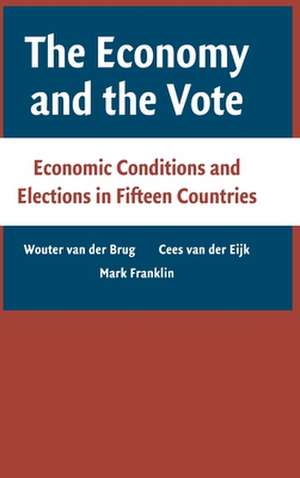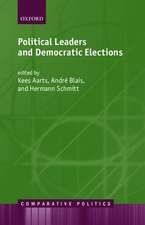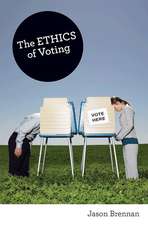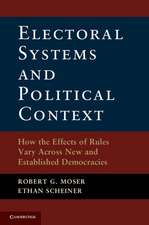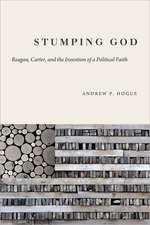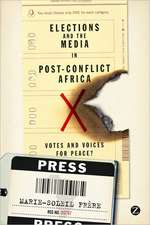The Economy and the Vote: Economic Conditions and Elections in Fifteen Countries
Autor Wouter van der Brug, Cees van der EijK, Mark Franklinen Limba Engleză Hardback – 29 apr 2007
| Toate formatele și edițiile | Preț | Express |
|---|---|---|
| Paperback (1) | 232.95 lei 6-8 săpt. | |
| Cambridge University Press – 29 apr 2007 | 232.95 lei 6-8 săpt. | |
| Hardback (1) | 529.18 lei 6-8 săpt. | |
| Cambridge University Press – 29 apr 2007 | 529.18 lei 6-8 săpt. |
Preț: 529.18 lei
Preț vechi: 575.19 lei
-8% Nou
Puncte Express: 794
Preț estimativ în valută:
101.26€ • 105.72$ • 83.80£
101.26€ • 105.72$ • 83.80£
Carte tipărită la comandă
Livrare economică 04-18 aprilie
Preluare comenzi: 021 569.72.76
Specificații
ISBN-13: 9780521863742
ISBN-10: 0521863740
Pagini: 244
Ilustrații: 36 tables
Dimensiuni: 158 x 235 x 20 mm
Greutate: 0.45 kg
Editura: Cambridge University Press
Colecția Cambridge University Press
Locul publicării:New York, United States
ISBN-10: 0521863740
Pagini: 244
Ilustrații: 36 tables
Dimensiuni: 158 x 235 x 20 mm
Greutate: 0.45 kg
Editura: Cambridge University Press
Colecția Cambridge University Press
Locul publicării:New York, United States
Cuprins
1. Studying economic voting; 2. Party choice as a two-stage process; 3. Hypotheses and data: the theoretical and empirical setting; 4. Effects of the economy on party support; 5. The economic voter; 6. From individual preferences to election outcomes; 7. The economy, party competition, and the vote.
Recenzii
"Van der Brug and company hit conventional wisdom hard. By their analysis, the economy, after all, influences the voter decision relatively little. The investigation, unique in its construction and provocative in its conclusion, begs to be read by comparative election scholars."
Michael Lewis-Beck, F. Wendell Miller Distinguished Professor of Political Science, University of Iowa
"The Economy and the Vote is an important book on an important subject. The authors develop a simple but powerful theoretical model that treats the vote decision as a two-stage process, where party preferences and party choice are taken separately. They then provide a truly exhaustive empirical analysis of the ways in which characteristics of parties and party competition structure economic effects on party preferences and, ultimately, the vote. The end result is compelling; it confirms and illuminates what we know to be true, and resolves puzzles that have eluded explanation until now. This book is certain to engage scholars for years to come."
Christopher Wlezien, Temple University
"One of the important contributions of this book is a recasting of economic voting theories in a more comprehensive two-stage model of voting behavior...this book provides powerful methodological and theoretical guidance for for students of voting behavior and an important reminder to bring the competitive dynamic back into our models of voting behavior."
Matthew M. Singer, Journal of Politics
Michael Lewis-Beck, F. Wendell Miller Distinguished Professor of Political Science, University of Iowa
"The Economy and the Vote is an important book on an important subject. The authors develop a simple but powerful theoretical model that treats the vote decision as a two-stage process, where party preferences and party choice are taken separately. They then provide a truly exhaustive empirical analysis of the ways in which characteristics of parties and party competition structure economic effects on party preferences and, ultimately, the vote. The end result is compelling; it confirms and illuminates what we know to be true, and resolves puzzles that have eluded explanation until now. This book is certain to engage scholars for years to come."
Christopher Wlezien, Temple University
"One of the important contributions of this book is a recasting of economic voting theories in a more comprehensive two-stage model of voting behavior...this book provides powerful methodological and theoretical guidance for for students of voting behavior and an important reminder to bring the competitive dynamic back into our models of voting behavior."
Matthew M. Singer, Journal of Politics
Notă biografică
Descriere
This book estimates he effects of economic conditions on the behaviour of individual voters and on election outcomes.
